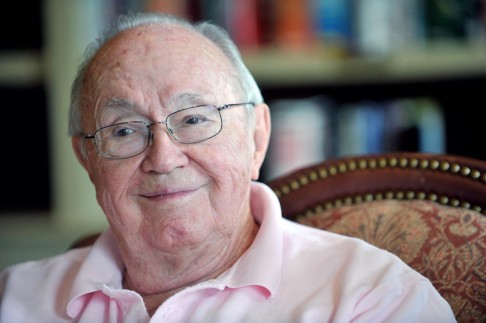
Last Hiroshima bomb crew survivor Theodore VanKirk dies at 93
Theodore VanKirk's mission hastened end of second world war and ushered in the atomic age
The last surviving member of the crew that dropped an atomic bomb on Hiroshima, hastening the end of the second world war and forcing the world into the atomic age, has died in the southern United States.
Theodore VanKirk, also known as "Dutch", died of natural causes at a retirement home in Stone Mountain, Georgia, his son Tom VanKirk said. He was 93.
VanKirk flew nearly 60 bombing missions, but it was a single mission in the Pacific that secured him a place in history. He was 24 years old when he served as navigator on the Enola Gay, the B-29 Superfortress that dropped the first atomic bomb deployed in wartime over the Japanese city of Hiroshima on August 6, 1945.
He was teamed with pilot Paul Tibbets and bombardier Tom Ferebee in Tibbets' fledgling 509th Composite Bomb Group for Special Mission No 13.

They didn't know whether the bomb would actually work and, if it did, whether its shockwaves would rip their plane to shreds. They counted - one thousand one, one thousand two - reaching the 43 seconds they'd been told it would take for detonation and heard nothing.
"I think everybody in the plane concluded it was a dud. It seemed a lot longer than 43 seconds," VanKirk (inset) recalled.
Then came a bright flash. Then a shockwave. Then another shockwave.
The blast and its after effects killed 140,000 in Hiroshima.
Three days later, a second atomic bomb was dropped on Nagasaki. The blast and its aftermath claimed 80,000 lives. Six days later, Japan surrendered.
"I honestly believe the use of the atomic bomb saved lives in the long run. There were a lot of lives saved. Most of the lives saved were Japanese," VanKirk said.
However, his experience also made him wary. "I personally think there shouldn't be any atomic bombs in the world - I'd like to see them all abolished.
"But if anyone has one," he added, "I want to have one more than my enemy."
VanKirk stayed on with the military for a year after the war ended. Then he went to university, earned degrees in chemical engineering and signed on with DuPont, where he stayed until he retired in 1985. He later moved from California to the Atlanta area to be near his daughter.
Like many second world war veterans, VanKirk did not talk much about his service.
"I didn't even find out that he was on that mission until I was 10 years old and read some old news clippings in my grandmother's attic," Tom VanKirk said.
